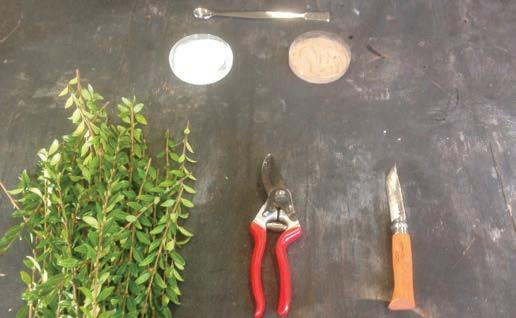13 / INSIGHT
Education, Communities
and the role of horticulture in Ireland
In her second feature exploring the wider benefits of horticultural activity, Rachel Freeman shares her insights into the role horticultural education can play in sharing knowledge and building resilience in communities
I
reland has a rich history in community based activities, such as community gardening and environmental improvement endeavours. Although popularised in recent years, their underlying philosophy is nothing new. For centuries meitheals came together to gather the harvest in towns and villages all over Ireland. Gatherings and helping out neighbours and friends in the community is a long established part of Irish tradition. The number of community garden spaces and related horticultural and environmental activities is on the rise, flourishing in towns and villages throughout Ireland. These spaces are often situated in urban areas on previously neglected and forgotten pieces of ground, at the outset many are devoid of even the most meagre amount of plant material. Through a gathering of like minded individuals prepared to roll up their sleeves and get involved, these community gardens become havens of the natural environment, providing a structure and horticultural opportunity that people can easily engage with.
Community gardens and health Working in community gardens offers the potential for very positive social and economic outcomes, as well as having a good environmental impact on the community. Growing our own food and eating well, spending time outdoors, exercising through work and in companionship, using the social nature of the space, practicing sustainability, reducing and composting waste, harvesting rainwater and recycling all lead to positive benefits for individuals and communities. Opportunities are offered for people to socialise, and because of their nonthreatening nature are easy to take part in. For individuals in the community these spaces can give purpose and meaning to life, or become a credible alternative to gyms or keep fit classes. A recent headline in the Irish Times (‘Ireland set to become the most obese country in Europe’) is based on a report from the World Health Organisation indicating that Ireland’s obesity rate is rising rapidly. Couple this with the increase in mental health issues, and it’s easy to see that these spaces need the
Bug Hotel for garden: Designed and built by ITB students and Blakestown Drive Community Group (BDCG) members
recognition and support they deserve as beneficial therapeutic spaces. Being in an outdoors environment enjoying our natural surrounds provides for our innate emotional need to connect with nature. Environments such as community gardens have a proven restorative effect on human beings. They inspire, grow and heal our bodies and minds while improving our natural environment. Moderate activity in a natural environment can improve mental health. Gardening fits right in with this thinking, with the added benefits of gaining our daily vitamin D quotient, burning calories while releasing positive mood altering endorphins.
Education and environment Just last year in the Irish Times, Laura Burke, director general of the EPA, was quoted saying: “The development of key economic sectors depends on a clean, green Ireland. We need to mobilise everyone living in Ireland to place the environment at the heart of their decisions and actions every single day. Only by asking ‘What is this doing to our environment?’ can we build a sustainable future. We need to eat, work and travel. But our challenge is to do this within the planet’s capacity.
Autumn/Winter 2016 / www.horticulture.ie / HORTICULTURECONNECTED
41











